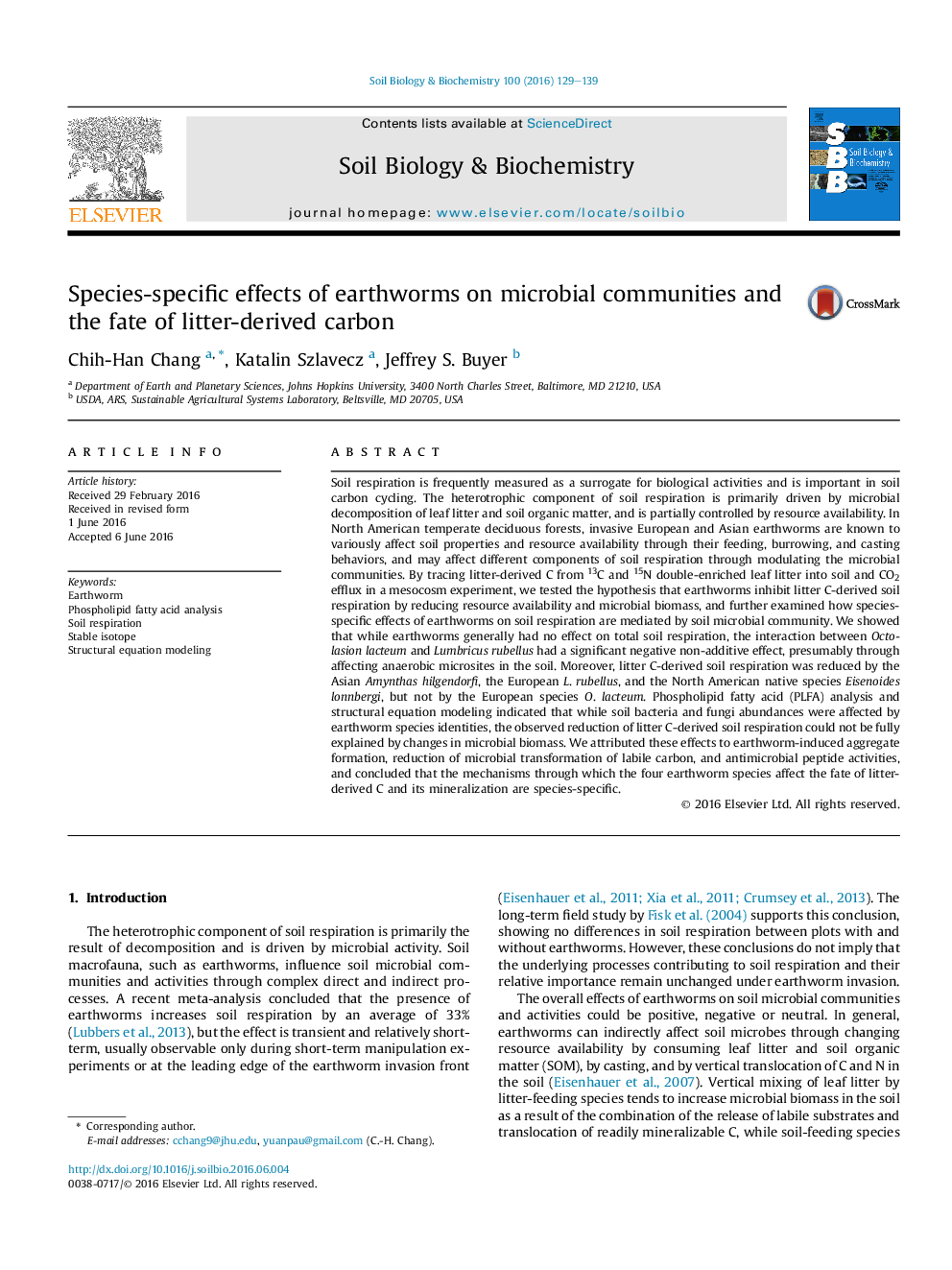| کد مقاله | کد نشریه | سال انتشار | مقاله انگلیسی | نسخه تمام متن |
|---|---|---|---|---|
| 8363499 | 1542584 | 2016 | 11 صفحه PDF | دانلود رایگان |
عنوان انگلیسی مقاله ISI
Species-specific effects of earthworms on microbial communities and the fate of litter-derived carbon
ترجمه فارسی عنوان
اثرات خاص کرم های خاکی بر جوامع میکروبی و سرنوشت کربن مشتق شده از بستر
دانلود مقاله + سفارش ترجمه
دانلود مقاله ISI انگلیسی
رایگان برای ایرانیان
کلمات کلیدی
کرم خاکی، تجزیه اسید چرب فسفولیپید، تنفس خاک، ایزوتوپ پایدار، مدل سازی معادلات ساختاری،
موضوعات مرتبط
علوم زیستی و بیوفناوری
علوم کشاورزی و بیولوژیک
دانش خاک شناسی
چکیده انگلیسی
Soil respiration is frequently measured as a surrogate for biological activities and is important in soil carbon cycling. The heterotrophic component of soil respiration is primarily driven by microbial decomposition of leaf litter and soil organic matter, and is partially controlled by resource availability. In North American temperate deciduous forests, invasive European and Asian earthworms are known to variously affect soil properties and resource availability through their feeding, burrowing, and casting behaviors, and may affect different components of soil respiration through modulating the microbial communities. By tracing litter-derived C from 13C and 15N double-enriched leaf litter into soil and CO2 efflux in a mesocosm experiment, we tested the hypothesis that earthworms inhibit litter C-derived soil respiration by reducing resource availability and microbial biomass, and further examined how species-specific effects of earthworms on soil respiration are mediated by soil microbial community. We showed that while earthworms generally had no effect on total soil respiration, the interaction between Octolasion lacteum and Lumbricus rubellus had a significant negative non-additive effect, presumably through affecting anaerobic microsites in the soil. Moreover, litter C-derived soil respiration was reduced by the Asian Amynthas hilgendorfi, the European L. rubellus, and the North American native species Eisenoides lonnbergi, but not by the European species O. lacteum. Phospholipid fatty acid (PLFA) analysis and structural equation modeling indicated that while soil bacteria and fungi abundances were affected by earthworm species identities, the observed reduction of litter C-derived soil respiration could not be fully explained by changes in microbial biomass. We attributed these effects to earthworm-induced aggregate formation, reduction of microbial transformation of labile carbon, and antimicrobial peptide activities, and concluded that the mechanisms through which the four earthworm species affect the fate of litter-derived C and its mineralization are species-specific.
ناشر
Database: Elsevier - ScienceDirect (ساینس دایرکت)
Journal: Soil Biology and Biochemistry - Volume 100, September 2016, Pages 129-139
Journal: Soil Biology and Biochemistry - Volume 100, September 2016, Pages 129-139
نویسندگان
Chih-Han Chang, Katalin Szlavecz, Jeffrey S. Buyer,
